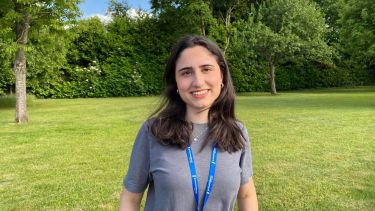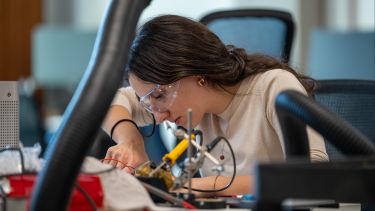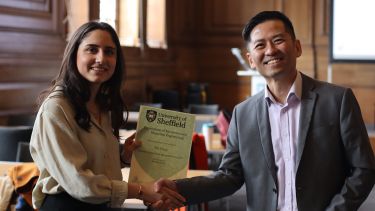Ece talks about her experience on the BEng in Electrical and Electronic Engineering
Why did you choose your course?
I wanted to understand the common electronic devices we use every day with the hopes of contributing to developments in this area. I have a big interest in physics too, so I was also motivated by the semiconductor physics material the modules cover.
What have you enjoyed most about your course?
I really enjoy the holistic teaching the department delivers which has enabled me to comprehend electronics wholly, all the way from underlying semiconductor physics to very large scale integrated systems. This, combined with numerous hands-on training experiences we receive, prepares students to adapt to work life easily upon finishing our studies.
What do you think about Sheffield as a city?
Sheffield is such a student-oriented city, it is as if it were designed for us - which makes the student experience 10 times better! I particularly like how our university has a city campus.
Where did you do an industrial placement, and how did you find it?
I worked as an electronics design engineer in research and development at PerkinElmer. Even though I have learned a great deal about my field of engineering, due to the interconnectivity of the teams in R&D, there were also opportunities to do work outside my expertise, some of which are firmware writing, CAD modelling, and 3D printing. Getting familiar with these concepts has enabled me to develop a more holistic understanding of engineering which I believe is a great step towards becoming a well-equipped engineer.
What/where was your placement?
Electronics Design Engineer at R&D
I worked on electronic schematic and PCB design, firmware development, and prototype testing. PerkinElmer/Seer Green
What advice would you give to a younger student considering studying engineering/science/maths at university
I would suggest reading more about the field and current developments in the industry. If possible, chatting to STEM graduates or people already working in this area, attending university open days (especially interactive ones where participants undertake experiments), and gaining some practical skills beforehand such as coding are definitely advantageous.
What role you are going onto next year with Siemens?
I will be starting a graduate scheme with Siemens Mobility this summer. As part of this 2-year scheme, I will get the opportunity to work at different departments within R&D which is something I am really looking forward to.
How did you get the role? What was the process?
I was offered my role after attending the Sir William Siemens Challenge-an annual hackathon organised by Siemens. This hackathon is a great opportunity for students to get some industry experience and you can read the article I wrote about my experience taking part in the event at this link.
Did your course and/or your placement year help you to secure this role?
My industry experience has helped me tremendously as I was able to apply the skills I learned during my placement to the task we were given at the hackathon.

International undergraduate scholarships
We are offering scholarships of £2,500 for each year (subject to a 60% average) of your undergraduate degree. The maximum value is £10,000 for four-year programmes.



